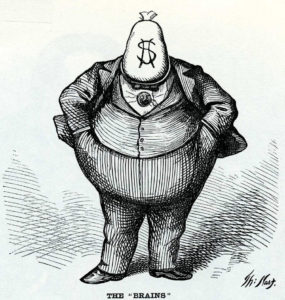Corporations may be run by people, and employ people, and be answerable to shareholders, but corporations are not people. For one thing, they command masses of cash and other assets that ordinary people cannot even dream of. This gives corporations advantages over ordinary people that need to be offset, not weaponized.
January 21 marked the 10th anniversary of the Supreme Court’s decision in Citizens United v. Federal Elections Commission, which ended restrictions on corporate and other donations in politics, protecting such donations as free speech. That decision unleashed torrents of money —particularly from wealthy individuals who amassed fortunes as heads of corporations — through super-PACs that influence voters through advertising and contributions to political campaigns.
If our political leaders want to get re-elected, they have to spend more of their time courting wealthy donors. This gives donors great leverage and reduces the time politicians have to do the work of the people. This corrupts our democracy. There are better ways to ensure fair elections.

Polls shows a large majority of Americans of all political leanings agree Citizens United was a bad decision. The only way to reverse a Supreme Court decision is through an amendment to the Constitution. That is an arduous process, but progress is being made.
Here in Massachusetts, in November 2018 voters overwhelmingly approved Question 2, creating a commission to make constructive policy recommendations. In the State House, a bill is pending with bipartisan sponsorship, including our own Sen. Julian Cyr and Rep. Sarah Peake, urging Congress to draft an amendment declaring that corporations are not people and corporate political donations are not deserving of free speech protections.
In Washington, two competing bills have been introduced in the House of Representatives. HJR48 is the more powerful and deserves greater support. It has 67 co-sponsors (all Democrats), including our Rep. Bill Keating. HJR2 (with 209 sponsors, including two Republicans) says local, state, and federal governments may regulate campaign spending, but HJR48 says governments shall do so. Not just an option, a duty. HJR48 says campaign finance must be regulated so “no person gains, as a result of that person’s money, substantially more access or ability to influence” elections. HJR2 contains no such clear, powerful statement.
A bill comparable to HJR48 may soon be introduced in the U.S. Senate.
Cape Cod has a rural economy, and corporations are not big employers here. Policies that reinforce the advantages corporations already enjoy enhance their power, to the disadvantage of our citizens and small businesses. All of us should contact our state and federal senators and representatives telling them we need a Constitutional amendment to reverse the Citizens United decision.
Terry Gallagher represents Eastham on the Barnstable County Assembly of Delegates but in this article is commenting as a private citizen.



